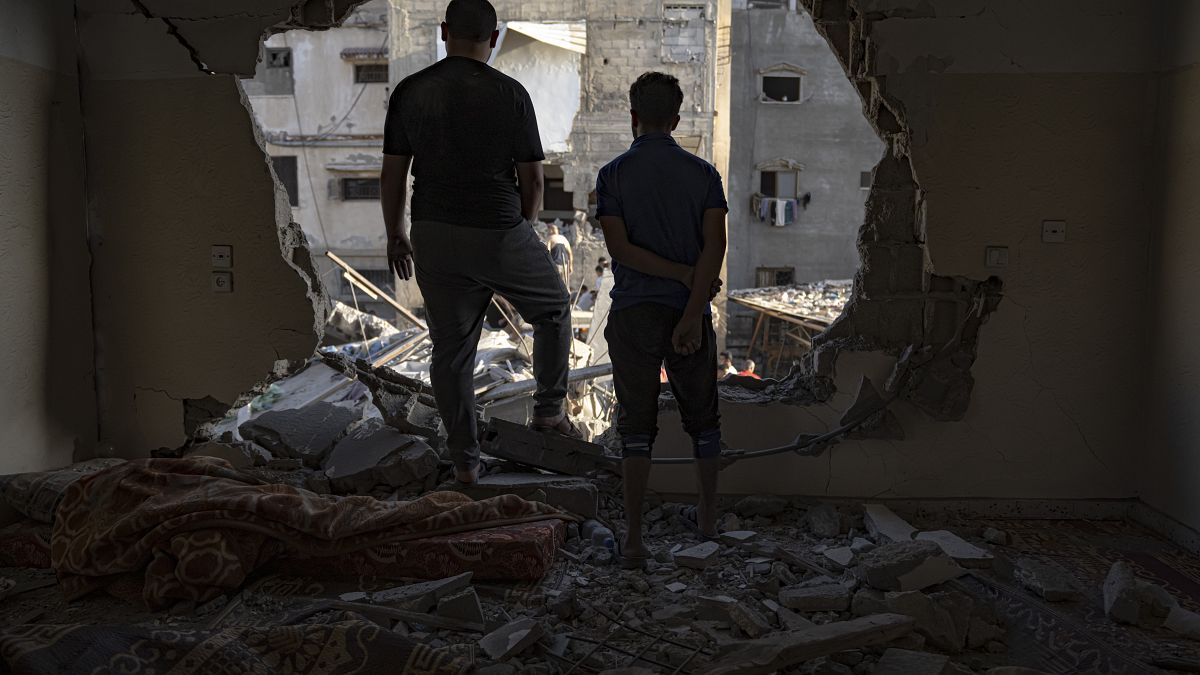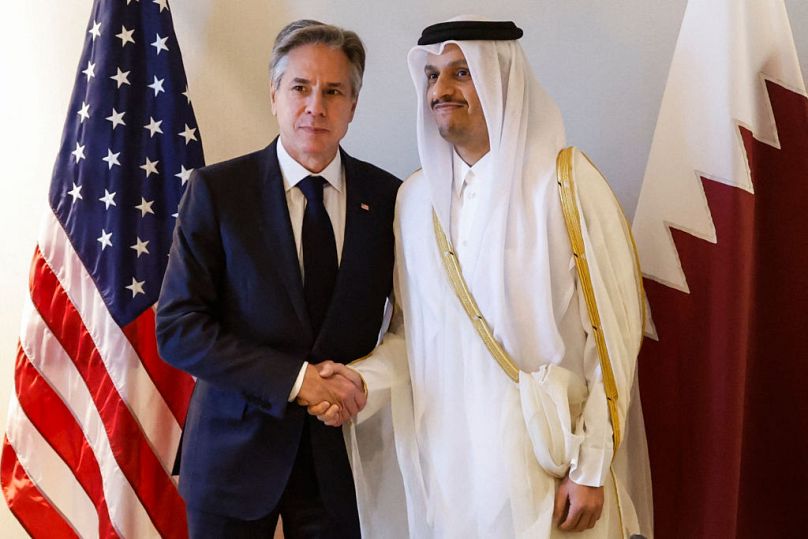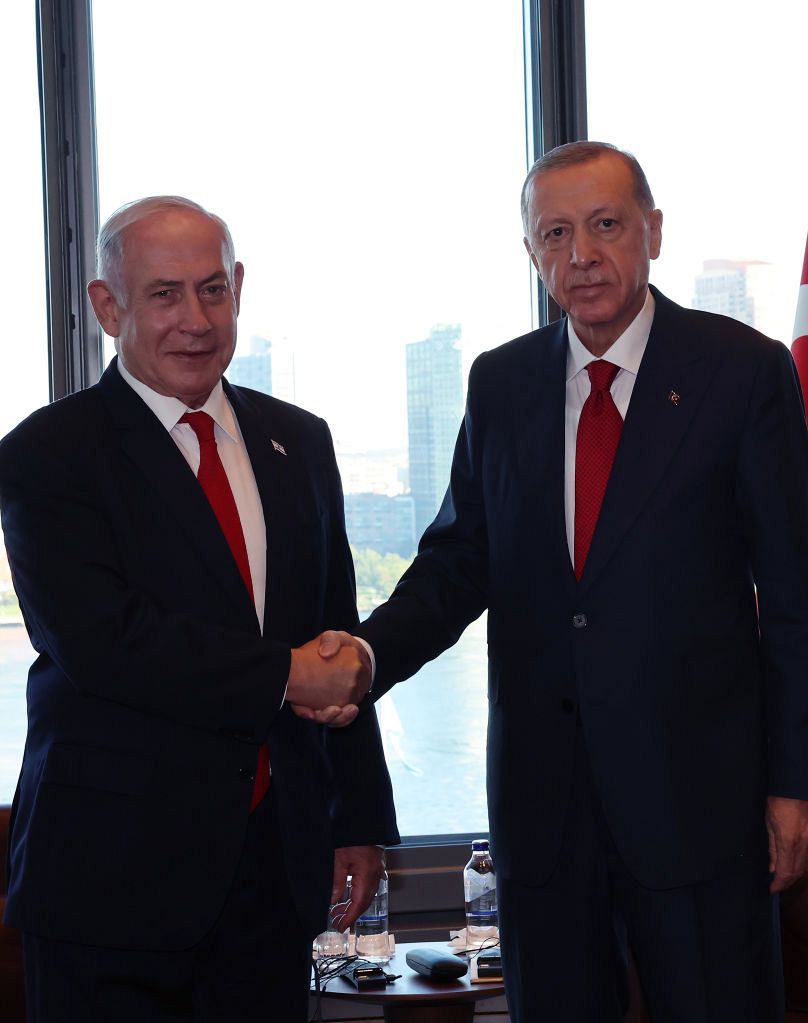The latest developments from the Israel Hamas war.
Blinken reaffirms US support for ‘humanitarian pause’ in Gaza
Antony Blinken has reiterated that the United States supports “humanitarian pauses” in the conflict between Israel and Hamas.
“The United States believes that all of these efforts will be made easier by these humanitarian pauses,” Blinken said at a news conference in Amman of efforts to spare Palestinian civilians and speed up the delivery of aid to the Gaza Strip.
His comments came as the US Secretary of State tries to build support among Arab nations countries for planning a postwar future for Gaza
Blinken has been seeking to make plans for a postwar future for Gaza as he met with wary Arab leaders during his latest urgent mission to the Middle East since the Israel-Hamas conflict began.
His talks in Jordan's capital with the officials, angry and deeply suspicious of Israel as it intensifies military operations, came a day after Israeli Prime Minister Benjamin Netanyahu snubbed Blinken's blunt warning that Israel risks losing any hope of an eventual peace deal with the Palestinians unless it eases the humanitarian crisis in Gaza.
Blinken's first meeting was with Lebanon’s caretaker prime minister, Najib Mikati, whose economically and politically ravaged country is home to Hezbollah, an Iranian-backed force that is hostile to Israel. The United States has grave concerns that Hezbollah, which has stepped up rocket and cross-border attacks on northern Israel, will take a more active role in the Israel-Hamas war.
Hezbollah's chief, Hassan Nasrallah, gave his first major speech on Friday since the Hamas attacks on 7 October, but did not forecast his group’s greater involvement.
Blinken thanked Mikati for his leadership “in preventing Lebanon from being pulled into a war that the Lebanese people do not want.”
Blinken also discussed US efforts to secure humanitarian assistance for civilians in Gaza.
Neither Blinken nor Mikati addressed reporters at the start of their meeting. Blinken did not speak publicly as he posed for pictures with Qatar’s foreign minister, whose country has emerged as the most influential interlocutor with Hamas. Qatar has been key to negotiating the limited release of hostages held by Hamas as well as persuading Hamas to allow foreign citizens to leave Gaza and cross into Egypt.
Blinken also met with the head of the UN agency in charge of assisting Palestinian refugees, thanking Phillipe Lazzarini for his group’s “extraordinary work every single day as a lifeline to Palestinians in Gaza and a great, great cost.” The agency has seen about 70 staffers killed in the war so far and is running critically low on necessary supplies such as food, medicine and fuel.
Later, Blinken went into joint talks with the foreign ministers of Qatar, Jordan, Egypt, Saudi Arabia and the United Arab Emirates, and the chair of the PLO executive committee. All have denounced Israel’s tactics against Hamas, which they say constitutes unlawful collective punishment of the Palestinian people.
Blinken to visit Turkey after visit to Israel and Jordan
US Secretary of State Antony Blinken will visit Turkey on Sunday and Monday as part of a tour of the Middle East amid the intensifying conflict between Israel and Hamas, the US State Department has announced.
Blinken has been visiting Jordan on Saturday for discussions with the United States' Arab partners, after having left Israel the day before.
He is trying to call for the sparing of Palestinian civilians trapped in the conflict between Israel and Hamas and to accelerate the delivery of humanitarian aid in the Gaza Strip, as well as longer-term prospects.
The State Department did not confirm in its press release a meeting between Blinken and the Turkish president, although one is expected.
Turkey announces recall of its ambassador to Israel
Turkey has announced the recall of its ambassador to Israel for consultations, due to Israel's refusal to accept a ceasefire in Gaza.
Ambassador Sakir Ozkan Torunlar was recalled in view of "the ongoing humanitarian tragedy in Gaza caused by Israel's continued attacks on civilians and Israel's refusal (to accept) a ceasefire," the Turkish Foreign Ministry said.
Turkey: for Erdogan, Netanyahu is 'no longer someone we can talk to'
Turkish President Recep Tayyip Erdogan said on Saturday that he was cutting off all contact with Israeli Prime Minister Benjamin Netanyahu due to Israel's actions in the Gaza Strip.
"Netanyahu is no longer someone we can talk to. We have given up on him," said Erdogan, according to comments reported by Turkish media.
On 25 October, the Turkish president, who met Benjamin Netanyahu most recently in September in New York, announced that he was abandoning all his plans to travel to Israel, claiming to have been "abused" by the Israeli Prime Minister.
“You will not find any other state whose army behaves with such inhumanity,” he said regarding the reprisals carried out by Israel in Gaza.
The Palestinian Hamas Health Ministry announced on Saturday that 9,488 people, including 3,900 children, had been killed in the Gaza Strip since the start of the war with Israel, which is carrying out incessant air raids there.
Israel announced on 29 October to withdraw all of its diplomats from Turkey.
Erdogan clarified on Saturday that Turkey was not breaking diplomatic relations with Israel.
“Completely severing ties is not possible, especially in international diplomacy,” Mr Erdogan said.
He explained that the head of the Turkish Intelligence Agency (MIT), Ibrahim Kalin, was spearheading Turkey's efforts to try to end the war, through mediation.
Erdogan added, though, that he believes Netanyahu is mainly responsible for the violence and has “lost the support of his own citizens”.
“What he needs to do is step back and put an end to this situation,” Erdogan said.
Gaza: Hamas Health Ministry announces 15 dead in UN school after Israeli bombardment
The Hamas government's Health Ministry has announced that 15 people were killed in an Israeli bombing that hit a school sheltering displaced people in a refugee camp in the northern Gaza Strip.
“The massacre at the al-Fakhoura school perpetrated by the Israeli occupiers this morning left 15 martyrs and 70 injured,” ministry spokesperson Ashraf al-Qidreh said at a press conference.
The ministry initially published a report of 12 dead and 54 injured.
No comment could immediately be obtained from the UN’s agency for Palestinian refugees (UNRWA), which manages the affected school.
On Friday evening, a strike on a school - transformed into a makeshift shelter for displaced people in the northern Gaza Strip - left 20 dead and dozens injured, according to the Hamas government.
On 2 November, UNRWA announced that four of its schools in the territory housing war-displaced people had been hit by bombings which left 23 dead.
UN deplores ‘sharp increase in hatred’ across the globe since 7 October
The United Nations High Commissioner for Human Rights Volker Türk deplored on Saturday "a sharp increase in hatred" in the world since the Hamas attacks on October 7.
Türk strongly deplored, in a press release, the increase in cases of anti-Semitism, Islamophobia and other hate speech.
"The impact of this crisis... has reverberated everywhere, dehumanising both Palestinians and Jews. We are seeing a significant increase in hate speech, violence and discrimination, a deepening social fractures and polarisation, as well as the denial of the rights to freedom of expression and peaceful assembly,” he said.
“I have heard Jews and Muslims say they do not feel safe, and that saddens me,” Türk added.
The High Commissioner also denounced the “inflammatory, toxic and hateful rhetoric” used by political leaders. “The torrent of hate speech used, including on social media, is abhorrent,” he said.
“International law is clear on this matter. Any appeal to national, racial or religious hatred that constitutes incitement to discrimination, hostility or violence is prohibited,” he said.
Türk also expressed concern about the limits imposed on freedom of expression in the context of the conflict, noting that some countries had decided on significant restrictions on the right to demonstrate, citing risks linked to national security or glorification of terrorism.
“States must guarantee a safe space conducive to participation and debate,” he said. “They cannot unduly restrict participation and debate or critical commentary on the conflict, or expressions of solidarity with Israelis or Palestinians.”
“In some cases, we have seen blanket or disproportionate restrictions on gatherings, primarily in the context of pro-Palestinian protests,” he added.
UN chief 'horrified' by Israeli attack on ambulance
UN chief Antonio Guterres has said he is "horrified" by an Israeli army strike on an ambulance in Gaza on Friday, adding that the conflict between Israel and Hamas "must stop".
“I am horrified by the reported attack in Gaza on an ambulance convoy outside al-Chifa hospital. The images of bodies strewn in the street outside the hospital are heartbreaking,” the Secretary General expressed in a press release.
Netanyahu rejects United States’ appeal for a humanitarian pause in Gaza
Israel and the US appear to be taking divergent approaches to securing the release of the more than 200 hostages held by Hamas in Gaza.
A senior Biden administration official said on Friday the US believes the fighting will need to take a “fairly significant pause” to allow for their release - modelled on a smaller-scale letup last month that allowed two American hostages to be freed.
The official, who spoke on the condition of anonymity under White House rules, said the release was a “testing pilot” for how a broader deal could be struck and that negotiations on a “larger package” of hostages are ongoing. The official emphasised it would require a significant halt in fighting to ensure their safety.
Israel has insisted hostage releases must precede any pause, as it seeks to up the pressure on Hamas and force the militant group’s hand.
After a meeting on Friday with Antony Blinken, the American Secretary of State, Benjamin Netanyahu rejected the idea of "a temporary truce" without releasing the hostages.
While the United States is against a ceasefire, it has called for pauses in fighting to allow the delivery of humanitarian aid that has begun entering the Gaza Strip via Egypt, but in insufficient quantity according to the UN.
The Gaza Strip, a small territory of 362 square kilometres populated by 2.4 million inhabitants, has been placed under "complete siege" since 9 October by Israel, which has cut off supplies of water, electricity and food.
The territory was already subject to an Israeli land, air and sea blockade since Hamas took power there in 2007.
UN condemns Israeli strike on ambulance in Gaza
The UN has condemned the bombing of an ambulance which killed fifteen people on Friday in Gaza, a strike confirmed by the Israeli army.
They claimed their attack was intended to target members of Hamas - something the military group has denied.
“I am horrified,” UN Secretary-General Antonio Guterres said in a statement, adding: “The images of the bodies strewn in the street outside the hospital are heartbreaking.”
Israeli aircraft “struck an ambulance that was identified by the forces as being used by a Hamas terrorist cell near their position in the combat zone,” the Israeli army said in a statement.
Israel's claims "about the presence of fighters inside the targeted ambulances are false, and they are new lies added to the constant lies... used to justify its crimes", Hamas said in a statement published on Telegram.
According to the Hamas Ministry of Health, the strike left 15 dead and 60 injured.
Spokesperson Ashraf al-Qidreh said the ambulance was part of a convoy which transported "several injured people on their way to be hospitalised in Egypt".
The toll was confirmed by the Red Crescent, which added that a doctor had been slightly injured by shrapnel in one leg.
They added that "the deliberate targeting of medical teams constitutes a serious violation of the Geneva Convention”.
Director-General of the World Health Organisation (WHO) Tedros Adhanom Ghebreyesus, posted on Twitter - formerly X - saying he was "utterly shocked" and reiterating that: “patients, health workers, facilities, and ambulances must be protected at all times. Always”, while calling once again for a ceasefire.
Israeli strikes ‘terrorist cells’ on Hezbollah positions - army
The Israeli army announced on Saturday that it had struck "two terrorist cells" and a Hezbollah "observation post" in response to attempted firing from Lebanon towards Israeli territory.
“In response to two terrorist cells attempting to fire from Lebanon towards Israeli territory, the Israeli army struck the cells and a Hezbollah observation post,” the army said in a statement.
They also indicated that they had responded to mortar fire coming from Lebanon towards Israeli localities "in the north of Israel", specifying that they had not caused any injuries.
Since 7 October 7, the Lebanese-Israeli border has been the scene of frequent exchanges of fire between the Israeli army on one side and the powerful Lebanese movement Hezbollah and its allies on the other, who support Hamas.
In his first speech since the start of the conflict, Hezbollah leader Hassan Nasrallah on Friday accused the United States of being "entirely responsible" for the war between Israel and Hamas.
He also warned Israel against the "stupidity" that an attack on Lebanon would represent, adding that stopping the "aggression against Gaza" would prevent a regional conflict.
The rise in tensions on the Israeli-Lebanese border has raised fears of a regional extension of the war between Israel and Hamas.


